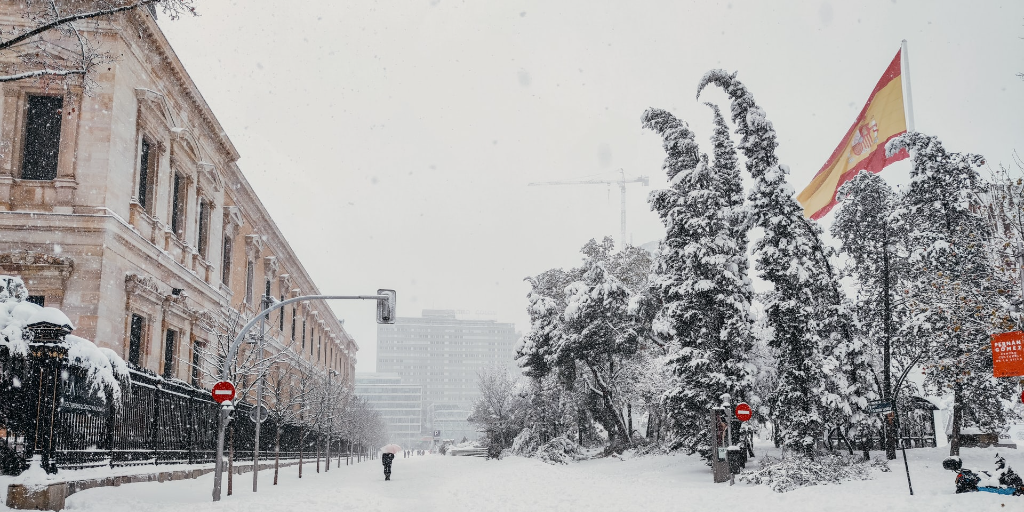A winter wonderland reached some unusual places this year
Lesson summary
Hi there everyone, thanks for joining us for another Plain English lesson, this time number 345. I’m Jeff; JR is the producer; and the full lesson is available at PlainEnglish.com/345.
Coming up today: If you live in Madrid, Jerusalem, or Texas, you’ve experienced a snowy winter. That can be good or that can be bad. Today we’ll talk about the snowfall that has reached some unlikely places here so far this year. The expression is “resort to” and JR has a song of the week.
Snow in unlikely places
Winter storm Filomena hit Madrid in January and dumped a foot and a half of snow on the Spanish capital over a three-day span. It was the most snow they had seen in central Spain in half a century, and it shut down transportation in and out of the city: the airport closed, trains halted, and over 12,000 miles of roads were either closed or blocked.
Pictures showed madrileños exploring the Gran Vía on cross-country skis, having snowball fights in Plaza Mayor, and making snow angels on the side of the highways. Two thousand people had to be rescued from cars stuck in the snow. The city ordered 3,500 tons of salt just for the occasion. The military helped clear the roads and spread the salt.
The snow fell from a Friday through a Sunday; schools and many businesses were closed through at least Wednesday.
The Israeli capital Jerusalem awoke on February 18 to a blanket of snow covering their ancient city. Observers of Judaism, Christianity and Islam plodded through the accumulating snow on their way to morning services while children threw snowballs—many of them seeing the white stuff for the first time.
Monuments like the Ancient Wall and the Dome of the Walk took on an exciting new look, as they were draped in white. It was such a spectacle that people drove from Tel-Aviv to Jerusalem that morning just to see the snowfall. It was the first time snow had fallen in Jerusalem in six years.
Elsewhere, snow fell in Syria, Jordan, Libya, and Lebanon. There’s something magical about the pure joy on the face of a small child or a dog playing in the snow for the first time. But perhaps the best pictures came from Saudi Arabia, as camels rested on a blanket of white as snow fell all around them.
And most recently, the American south experienced their coldest temperatures and biggest snow in years. States like Texas, Oklahoma, Arkansas, Tennessee, North Carolina and Louisiana, even northern parts of Mexico—usually areas with comfortable weather even in winter—were covered in snow and ice and plagued by record low temperatures. At one point, over 70 percent of the land area in the United States was covered by snowfall, an astounding total.
But unlike the snowfall in Madrid and Jerusalem, this storm caused real widespread suffering. Over thirty people died from the cold. Millions of people were left without power, heat, and water. The low temperatures—well below freezing—continued for days. Most people in these regions don’t have the kind of blankets, winter clothes, and equipment needed to stay warm in a house without power in below-freezing temperatures.
The occasional snowfall in a warm-weather area is fun and exciting. But if too much snow falls, it can be dangerous. In the American south, for example, most homes are not insulated against the cold. So if the outside temperature drops, the temperature inside homes drops quickly. Heating systems have to work extra hard, since the heat they produce is often lost quickly. This caused an overload of the Texas power grid, resulting in power cuts.
Some residents resorted to unsafe practices, like heating their homes with their gas ovens, running cars in their garages, and even building fires in makeshift fireplaces indoors—all things that can kill you.
Roads are dangerous, too. In places where snow is common, governments maintain fleets of vehicles and stores of salt to treat the roads. But where snow is less common, there aren’t enough trucks available to clear the roads. Madrid had to import the salt needed to improve traction on roads.
It takes some skill to drive in the snow, too. Many drivers overestimate their abilities to drive in snowy weather. It’s easy to lose control of a car, drive off the road, or get stuck in a dangerous situation.
Pushing a car in the snow
The only thing colder than the temperatures in Texas was the icy response to one of the state’s two US Senators. When the bad weather hit, he hopped on a plane with his two daughters and went to Cancún.
Even here in Chicago people overestimate their abilities to drive in the snow. Our biggest snow of the year was about a foot. Even here, a foot of snow is a lot. We’ve had more, but it’s a big snowstorm. I was out shoveling the sidewalk in front of my apartment building and saw someone driving—or, trying to drive, anyway—a Honda Fit.
A Honda Fit is a small car. If you have a Honda Fit, you have no business driving on the side streets until they’re cleared of snow. Well, this guy obviously got stuck in the middle of the road, blocking everyone else from getting through. So another neighbor and I had to push this guy’s car the entire block until he got up to a main road. So it’s not only the drives in the south who struggle with driving in the snow. If you’re not used to it, the best advice is to wait until it melts—or at least until the snowplows come to the streets by your house. It was good exercise for me, though.
Great stories make learning English fun

